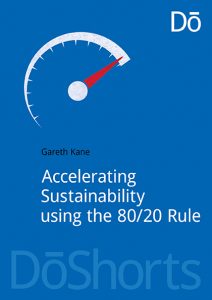Sustainability: pragmatism beats perfectionism every day of the week
 Yesterday I had a rare day out, attending the Net Zero North East event organised by our regional Local Enterprise Partnership. The keynote speakers couldn’t avoid the topic of the Government’s recent flip-flopping on Net Zero policies. The (newly) Independent regional Mayor Jamie Driscoll didn’t mince his words, lashing out at both Tory Government and Labour Opposition. Jonathan Oxley, who leads on Net Zero for the Confederation of British Industry (CBI) was more measured, calling for “clarity and consistency” on policy before remarking that we “mustn’t let policy perfection get in the way of policy progress”, meaning we shouldn’t use the Government’s actions as an excuse to do nothing.
Yesterday I had a rare day out, attending the Net Zero North East event organised by our regional Local Enterprise Partnership. The keynote speakers couldn’t avoid the topic of the Government’s recent flip-flopping on Net Zero policies. The (newly) Independent regional Mayor Jamie Driscoll didn’t mince his words, lashing out at both Tory Government and Labour Opposition. Jonathan Oxley, who leads on Net Zero for the Confederation of British Industry (CBI) was more measured, calling for “clarity and consistency” on policy before remarking that we “mustn’t let policy perfection get in the way of policy progress”, meaning we shouldn’t use the Government’s actions as an excuse to do nothing.
That sentiment may have been lost on an anonymous questioner from the floor. Noting some polling data on public awareness of Net Zero, they asked how we should engage the 11% of people who had never heard of it. I wanted to scream “don’t waste your time!”
My reason? 89% is an incredible level of awareness – in fact it is so high I am a bit suspicious of the methodology used – definitely more than enough to make good progress with. The 11% will be very hard/going on impossible to reach. So why expend time, energy on money on trying to hit a perfect 100% awareness when those resources could be used to make actual change happen and cut some carbon?
I’m a big fan of the 80:20 rule (did I mention I wrote a book about it?) which holds that 20% of your effort delivers 80% of your results. This suggests trying to hit perfection in any one area will take five times as much effort as ‘good’ just to make your outcome 25% better. Unless you have infinite resources, the same input (money, time, personal energy) could be used to get to ‘good’ in five different areas, cutting four times as much carbon for the same effort.
My advice is always ‘don’t chase perfection’. Net Zero is a mindset to aim for zero to encourage step-change thinking, but falling a little short doesn’t matter in the grand scheme of things – it’s not the moon programme where it is land safely or disaster. Don’t expect perfection in others either, or you will be sadly disappointed. ‘Good’ is something you can build on.

